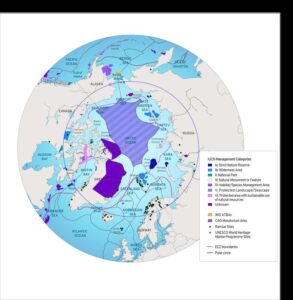
Preparing for Marine Conservation Amid Arctic Melting

Exclusive economic zones of the coastal states in the Arctic. IASS visualisation based on Flanders Marine Institute and GRID-Arendal.
Credit: IASS
The rapid rise in temperature in the Arctic is profoundly altering the region – with unknown consequences for the future. At the same time, dwindling sea ice is increasing economic interest in the Arctic Ocean. How can the Arctic be protected and used sustainably against this backdrop? To provide an overview of issues relevant to marine conservation in the Arctic, Ecologic Institute and the Institute for Advanced Sustainability Studies (IASS) have published a series of reports.

Overview of marine protected areas and other area-based management tools in the Arctic. IASS visualisation based on Flanders Marine Institute, GRID-Arendal, Ocean Conservancy, Ramsar, UNEP-WCMC and IUCN, UNESCO.
Credit: IASS
The reports focus on the five Arctic coastal states: Canada, Denmark (with Greenland), Norway, the Russian Federation and the United States. In addition, a sixth report provides a more comprehensive overview of the Arctic marine environment and summarises relevant international and regional regulations.
The reports cover four main topics: First, the main features of the marine environment of each Arctic region are described. Then the main pressures on marine biodiversity in the region’s ocean are examined, followed by an examination of the socio-cultural and economic roles and environmental impacts of the major sea-based human activities in each Arctic region. The final part of each report describes the marine policy system and provides an overview of relevant institutions and rules, regulations, and instruments that are or could be used to protect Arctic marine biodiversity and ensure sustainable use.
Study author Nicole Wienrich says: “The existing network of marine protected areas in the Arctic should be expanded to protect habitats for marine life. At the same time, other conservation measures must be introduced and coordinated to ensure the protection of Arctic ecosystems and the sustainable use of the region’s resources. All of these measures need adequate funding and must include dialogue and cooperation with local populations as well as across sectors and national borders.”
Wissenschaftliche Ansprechpartner:
Nicole Wienrich, nicole.wienrich@iass-potsdam.de
Dr. Nina Döring, nina.doering@iass-potsdam.de
Originalpublikation:
Wienrich, N. (2022): Marine Conservation in the Russian Arctic. – IASS Study, August 2022.
https://doi.org/10.48481/IASS.2022.028
Wienrich, N. (2022): Marine Conservation in Greenland. – IASS Study, August 2022.
https://doi.org/10.48481/IASS.2022.029
Wienrich, N. (2022): Marine Conservation in the Norwegian Arctic. – IASS Study, August 2022.
https://doi.org/10.48481/IASS.2022.030
Wienrich, N., Lukyanova, O. (2022): Marine Conservation in the Arctic: A Regional Perspective. – IASS Study, August 2022.
https://doi.org/10.48481/IASS.2022.031












